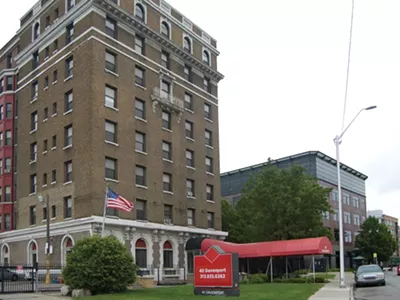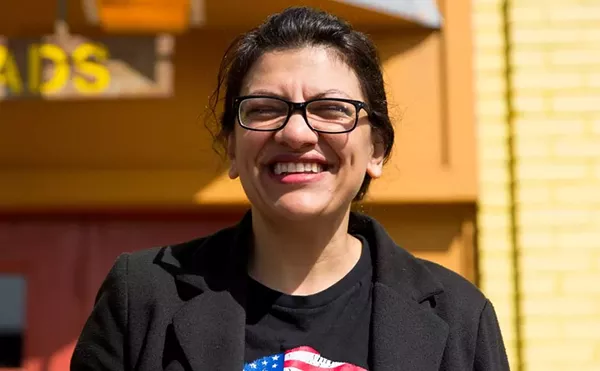Let's say you had a young politician named Adam Elliot who is handsome, charismatic, and whose string of degrees and accomplishments sounded like those of a spy fiction hero:
Three-letter athlete in high school (Bloomfield Hills' Andover High School), star lacrosse player, and academically, at the very top of his class at the University of Michigan, where he graduated with dual degrees in biology and political science.
That was followed (naturally) by stints as a Rhodes scholar, then a Marshall scholar in England.
Even before that, when he gave the student address at his U of M commencement, it wowed the main speaker, one President Bill Clinton, who urged him to forget medicine and go into politics. ("You're a natural," slick Willie said.)
Not yet, thought Elliot, who then quickly took Master's and Ph.D. degrees from Oxford University in England, and then an MD from Columbia. Just in case anyone thought that wasn't enough, he led a medical mission to Peru as a student, and became an assistant professor of epidemiology at Columbia.
Somehow, in his spare time, he managed to win research awards and pump out more than 100 scientific publications, from book chapters to major papers.
He wasn't chasing women; he married at 21, to a 19-year-old classmate who is now a psychiatrist. He was in charge of a Global Research Analytics for Population Health project at Columbia when Detroit Mayor Mike Duggan called and invited him to come back and rebuild the Detroit Health Department after the bankruptcy.
No problem, says Elliot, who was born here. Not only did he have it whipped into shape in barely a year; he then took on the disgraceful Animal Control department, and fixed that too.
Finally, Adam Elliott decides it's time to go from retail saving of the planet into wholesale, leaves his health department job, and jumps into politics full time — not, that is, in an attempt to get a seat on Detroit City Council or an utterly worthless one in the gerrymandered legislature.
Nope. He's running for the Democratic nomination for governor. By the way, despite everything he's accomplished, he is still only 32 years old. So... is this the Democratic Party's all-time too-good-to-be-true dream of a candidate?
Well, maybe... except for two little details:
His name is really Abdul El-Sayed.
And he is a Muslim, with a wife who wears a headscarf.
That wouldn't matter in a world where we didn't discriminate based on religion. But in Michigan, we do.
Last fall, Michigan Democrats nominated Ismael Ahmed for a seat on the State Board of Education. There wasn't a more deserving candidate in the state — or a more completely American Muslim in the nation.
Ish, as everyone knows him, cares passionately about two things: his community and education. He helped found ACCESS, the highly successful Arab Community Center for Economic and Social Services in 1971, ran it for many years, and built it into one of the nation's best and most studied private welfare agencies. Later, he was made head of Michigan's Department of Health and Human Services.
After that, he became associate provost at the University of Michigan-Dearborn. He is exactly the kind of person you'd want on the state board of education.
Yet not only did he lose, thousands of Democratic voters refused to support him. His running mate John Austin got 1,912,983 votes; Ahmed a mere 1,698,927.
Nearly a quarter of a million Democrats refused to support Ahmed, evidently just because he is a Muslim. Most don't seem to have voted Republican for that job instead; they just didn't cast a second education board seat at all.
If they won't vote for a Muslim for a job as low-profile and benign as state education board, do you think they'd vote for one for governor? "I think there's something to be learned from my experience," Ish, who hasn't endorsed anyone for governor, said dryly. "I think he (El-Sayed) faces an uphill battle."
Abdul — he encourages everyone to call him Abdul — refuses to be daunted by all that. "I'm a different person with a different personality," he told me. That's true enough.
To be sure, El-Sayed comes across as far more peppy. He claims to be going into this with eyes wide open. "I know that for 95 percent of the people I meet, my name is a liability," he told me one recent morning, over coffee in downtown Detroit near the new Ilitch playpen, with taxpayer-subsidized construction activity bustling all around us.
"But one thing is that they won't forget the name Abdul," he said, something probably true enough.
"And if I can just connect with them," Abdul says, he thinks he can win them over. That may well be largely true; he has a very winning personality. His positions on most issues ought to be appealing to most Democrats, especially Bernie Sanders fans.
Matter of fact, I didn't disagree with one of them. Trouble is, he'd have to win over about 400,000 people to win a Democratic primary, and at least four times that to have a chance of beating Bill Schuette in 2018.
Democratic strategist Brian Stone is anything but anti-Muslim; he courted Arab-American support during a failed bid for the legislature last year. He told me that when he came out as openly gay in high school, Muslim students were among the few who didn't pick on or bully him.
Yet Stone isn't supporting Abdul El-Sayed for an entirely different reason. He doesn't question his awesome intelligence.
But he notes that as a candidate, he has pretty close to zero practical political experience. "Granholm, Snyder, and Trump all lacked legislative experience and lacked an understanding of the political landscape," he posted on Facebook. As a result, "Their administrations have all been bogged down."
Plus, he adds, "Achieving change in a big-city health department where everyone is a Democrat is very different from doing it in a state where half the residents will question your intentions no matter who you are."
Those may be legitimate arguments. But on the other hand, Abdul's main rivals for the nomination are likely to be Mark Bernstein, the lawyer and U of M regent, and Gretchen Whitmer.
Bernstein has absolutely no Lansing experience. Whitmer does have that experience — but as a member of a perpetual minority caucus that was unsuccessful at forging many compromises or getting very much passed.
So what is going to happen? I can imagine a scenario where El-Sayed wins a close multi-candidate primary, only to lose in November. But then, what do I know?
Ten years ago, I explained patiently to a student ready to dedicate herself to a candidate that as much as I liked what he stood for, his cause was hopeless, and she needed to face it.
There was no way that the still fundamentally racist American people were going to vote for a black guy, I told her. Let alone one with a Muslim father and an exotic African name.






